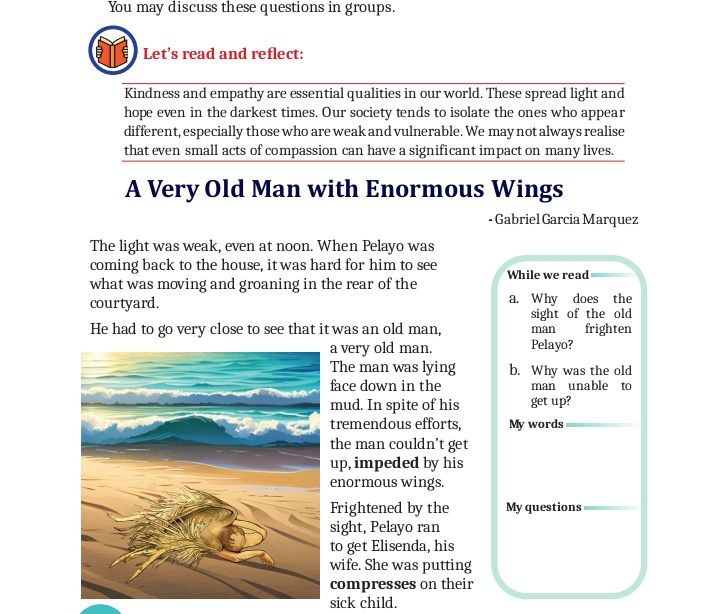Horegallu - Textual Questions
TEXTUAL QUESTIONS
1. What is a‘horegallu’? What is its purpose?
A horegallu is a stone bench. It helps tired persons to sit down and rest for sometime so that they can regain their energy.
A horegallu is a stone bench. It helps tired persons to sit down and rest for sometime so that they can regain their energy.
2. What are the special memories the author associates with ‘horegallu’?
The special memories the author associates with ‘horegallu’ are about her grandfather sitting on the horegallu talking with villagers who work in the nearby fields. Her grandfather was a retired school teacher and he would sit on the horegallu under the banyan tree in the village. The tired villagers would come and sit on the stone bench and talk to her grandfather. When she felt tired after playing she would also sit near her grandfather listening to the conversations he was having with the villagers resting there.
The special memories the author associates with ‘horegallu’ are about her grandfather sitting on the horegallu talking with villagers who work in the nearby fields. Her grandfather was a retired school teacher and he would sit on the horegallu under the banyan tree in the village. The tired villagers would come and sit on the stone bench and talk to her grandfather. When she felt tired after playing she would also sit near her grandfather listening to the conversations he was having with the villagers resting there.
3. How does the grandfather refresh the travellers?
The grandfather refreshed the travellers just by listening to them. The villagers would talk of their troubles to him and he would listen. This seemed to refresh them.
The grandfather refreshed the travellers just by listening to them. The villagers would talk of their troubles to him and he would listen. This seemed to refresh them.
4. Is ‘horegallu’ essential in a journey? Why?
‘Horegallu’ is essential in a journey. Any journey involves some distance. Life itself is supposed to be a journey. Every now and then we need to sit down, and refresh ourselves. There is nobody in this world that does not have problems of some sort. A sympathetic listener will help the person with troubles to relieve himself of his burden at least temporarily.
‘Horegallu’ is essential in a journey. Any journey involves some distance. Life itself is supposed to be a journey. Every now and then we need to sit down, and refresh ourselves. There is nobody in this world that does not have problems of some sort. A sympathetic listener will help the person with troubles to relieve himself of his burden at least temporarily.
5. ‘Horegallu ’ gives everyone the opportunity to regain their strength. What does the author try to indicate her?
It is true that horegallu gives everyone the opportunity to regain their strength. Life is a journey and we all need horegallus every now and then to regain our energy. The author is trying to tell us that we too must be like the horegallu. We may not be in a position to help everybody’ to solve his problems, but at least we can give people a sympathetic hearing and it will help them.
It is true that horegallu gives everyone the opportunity to regain their strength. Life is a journey and we all need horegallus every now and then to regain our energy. The author is trying to tell us that we too must be like the horegallu. We may not be in a position to help everybody’ to solve his problems, but at least we can give people a sympathetic hearing and it will help them.
6. Bring out the symbolic significance of the word ‘burden’.
‘Burden’ symbolically means our troubles and tribulations. There is nobody in the world that has no problems at all. Each problem is a burden. When we share our problem, our burden, with others, it will definitely relieve us.
‘Burden’ symbolically means our troubles and tribulations. There is nobody in the world that has no problems at all. Each problem is a burden. When we share our problem, our burden, with others, it will definitely relieve us.
7. Comment on the expression, ‘infectious cheerfulness’.
Infectious means ‘contagious’, something that spread fast. Like certain diseases, emotions are also infectious in the sense that they spread fast. When you attend a funeral, everyone wears a sad look. But when you attend a wedding, you have a happy look. A smiling person brings smile to your face. A cheerful person makes you also cheerful and this it is infectious.
Infectious means ‘contagious’, something that spread fast. Like certain diseases, emotions are also infectious in the sense that they spread fast. When you attend a funeral, everyone wears a sad look. But when you attend a wedding, you have a happy look. A smiling person brings smile to your face. A cheerful person makes you also cheerful and this it is infectious.
8. What does Ratna do during lunch hours?
During lunch hours, Ratna would sit with some person in one of the rooms and they would be chatting.
During lunch hours, Ratna would sit with some person in one of the rooms and they would be chatting.
9. What is Ratna’s simplistic outlook?
Her simplistic outlook is God has given her two ears to listen to others. She is not a trained counsellor or an intellectual and she can’t solve people’s problems. They have to do it themselves. She simply listens to the people with sympathy and without any judgment. She believes that when a person in stress finds an outlet for is worries, it relieves him a lot.
Her simplistic outlook is God has given her two ears to listen to others. She is not a trained counsellor or an intellectual and she can’t solve people’s problems. They have to do it themselves. She simply listens to the people with sympathy and without any judgment. She believes that when a person in stress finds an outlet for is worries, it relieves him a lot.
10. The author wishes there were many more of ‘horegallus’ in the world. Comment.
A horegallu is a stone bench on which tired people can rest and regain their energy. Such stones are usually under shady trees. Tired travellers unburden themselves, sit, and talk to some sympathetic listener. Life is a journey and we all are travellers. Each one of us carries burdens of various sorts. If there is some patient and sympathetic listener, we can unburden ourselves and feel relieved. The horegallu will not solve your problem but it gives you a temporary relief. The author expects each of us to be a horegallu.
A horegallu is a stone bench on which tired people can rest and regain their energy. Such stones are usually under shady trees. Tired travellers unburden themselves, sit, and talk to some sympathetic listener. Life is a journey and we all are travellers. Each one of us carries burdens of various sorts. If there is some patient and sympathetic listener, we can unburden ourselves and feel relieved. The horegallu will not solve your problem but it gives you a temporary relief. The author expects each of us to be a horegallu.



Comments
Post a Comment
Please share your feedback and questions